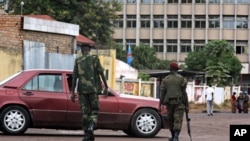The Democratic Republic of Congo (DRC) says an assault on its presidency was not an attempted coup d'etat. The attack left at least nine people dead.
The assault last Sunday on President Joseph Kabila's presidential palace was quickly denounced as an "attempted coup d'etat" by Mr. Kabila's spokesperson Lambert Mende.
But less than a week later, Mende held a press conference to tell observers inside and outside of his country that the assault was not a coup d'etat - because nobody has stepped forward to claim responsibility for the attack.
"We've seen a lot of talk about an attempted coup de'tat, and we're asking, on what basis are you calling this a coup? Mende asked. "Normally. a coup d'etat is something where somebody comes forward to claim responsibility."
Mende added that there has been no sign of that.
Even if the coup is not a political act, it comes at a highly-politicized time in this divided country
that finds itself headed for only its second multiparty elections in more than four decades.
And the mineral-rich country's east remains engulfed in civil war.
In November, the DRC will hold only its second multiparty election since the 1960s.
A law signed by the president in January reduces that election to a one-round vote, and has provoked heavy opposition because many see it as giving the president an easier path to re-election.
Kabila won office in 2006, following the assassination of his father, Laurent Kabila, who overthrew the 31-year reign of Mobutu Sese Seko.
Meanwhile, the International Monetary Fund warned, yesterday, that rising fuel and food prices are likely to have a heavy impact on this already impoverished nation, where inflation could accelerate deep into double-digit rates.
DRC Denies Attempted Coup Took Place
- By Drew Hinshaw




